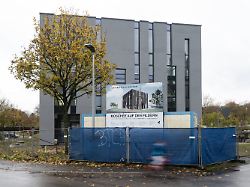Decision in the last instance
Association must return leasehold building rights for mosque property
January 19, 2024, 1:06 p.m
Listen to article
This audio version was artificially generated. More info | Send feedback
In 2014, the Association for Culture, Education and Integration concluded a leasehold agreement with the city of Leinfelden-Echterdingen for the construction of a mosque. Because the first construction phase has not yet been completed after four years, the parties are taking the matter to court. Now the BGH decides.
In the legal dispute over the delayed construction of a mosque near Stuttgart, the Federal Court of Justice (BGH) ruled in favor of the plaintiff municipality. The fifth civil senate in Karlsruhe ruled that a Muslim association had violated its contractual construction obligation by not completing the first construction phase within four years.
The BGH thus confirmed the ruling of the Stuttgart Higher Regional Court, which ruled in favor of the city of Leinfelden-Echterdingen in the Esslingen district in 2022. In 2014, this granted the association a so-called hereditary building right, which was intended to enable it to build a mosque on municipal property. But when the association did not complete the mosque on time within four years, the city demanded the leasehold building rights back as contractually agreed. It also involved the payment of more than 110,000 euros.
The parties had argued about whether the city’s right to reclaim was restricted. According to the contract, compensation for the leasehold is excluded. From the BGH’s point of view, this is okay in this specific case because, according to the association, the building, which is 90 percent completed, has a sales value that, according to the contract, the city will also compensate for when the property is repurchased.
In general, according to the ruling, municipalities must examine proportionality in such cases. Private lease holders should not be excessively penalized for violations. The municipalities would have to weigh up the seriousness of the violation and the possible consequences for those affected.
